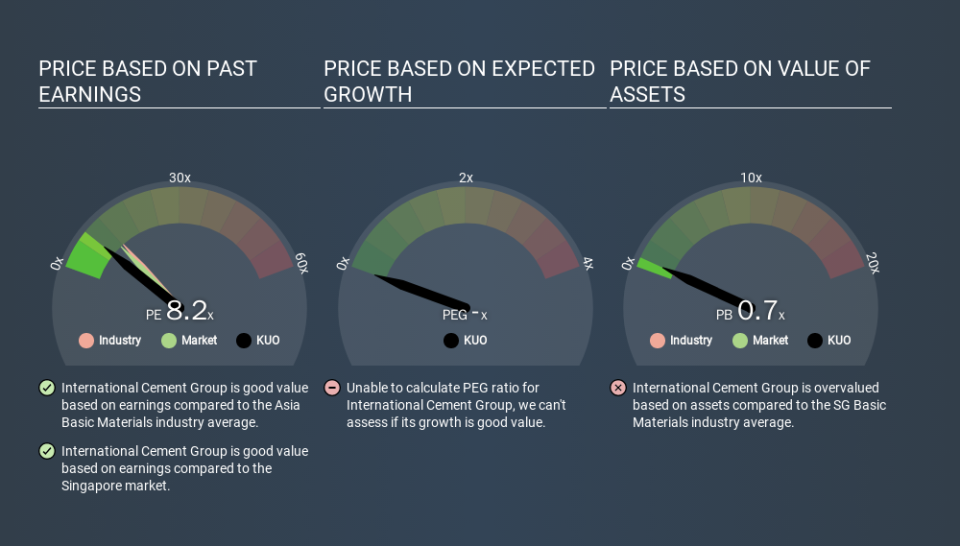How Does International Cement Group's (SGX:KUO) P/E Compare To Its Industry, After Its Big Share Price Gain?

International Cement Group (SGX:KUO) shareholders are no doubt pleased to see that the share price has bounced 41% in the last month alone, although it is still down 14% over the last quarter. Longer term shareholders are no doubt thankful for the recovery in the share price, since it's pretty much flat for the year, even after the recent pop.
Assuming no other changes, a sharply higher share price makes a stock less attractive to potential buyers. In the long term, share prices tend to follow earnings per share, but in the short term prices bounce around in response to short term factors (which are not always obvious). So some would prefer to hold off buying when there is a lot of optimism towards a stock. Perhaps the simplest way to get a read on investors' expectations of a business is to look at its Price to Earnings Ratio (PE Ratio). A high P/E implies that investors have high expectations of what a company can achieve compared to a company with a low P/E ratio.
View our latest analysis for International Cement Group
How Does International Cement Group's P/E Ratio Compare To Its Peers?
We can tell from its P/E ratio of 8.17 that sentiment around International Cement Group isn't particularly high. The image below shows that International Cement Group has a lower P/E than the average (12.2) P/E for companies in the basic materials industry.
International Cement Group's P/E tells us that market participants think it will not fare as well as its peers in the same industry. Since the market seems unimpressed with International Cement Group, it's quite possible it could surprise on the upside. You should delve deeper. I like to check if company insiders have been buying or selling.
How Growth Rates Impact P/E Ratios
P/E ratios primarily reflect market expectations around earnings growth rates. That's because companies that grow earnings per share quickly will rapidly increase the 'E' in the equation. That means unless the share price increases, the P/E will reduce in a few years. Then, a lower P/E should attract more buyers, pushing the share price up.
International Cement Group's earnings per share were pretty steady over the last year. But it has grown its earnings per share by 39% per year over the last five years.
Don't Forget: The P/E Does Not Account For Debt or Bank Deposits
The 'Price' in P/E reflects the market capitalization of the company. Thus, the metric does not reflect cash or debt held by the company. The exact same company would hypothetically deserve a higher P/E ratio if it had a strong balance sheet, than if it had a weak one with lots of debt, because a cashed up company can spend on growth.
Such expenditure might be good or bad, in the long term, but the point here is that the balance sheet is not reflected by this ratio.
So What Does International Cement Group's Balance Sheet Tell Us?
International Cement Group's net debt is 2.1% of its market cap. It would probably trade on a higher P/E ratio if it had a lot of cash, but I doubt it is having a big impact.
The Bottom Line On International Cement Group's P/E Ratio
International Cement Group trades on a P/E ratio of 8.2, which is below the SG market average of 11.4. EPS grew over the last twelve months, and debt levels are quite reasonable. The P/E ratio implies the market is cautious about longer term prospects. What is very clear is that the market has become less pessimistic about International Cement Group over the last month, with the P/E ratio rising from 5.8 back then to 8.2 today. For those who like to invest in turnarounds, that might mean it's time to put the stock on a watchlist, or research it. But others might consider the opportunity to have passed.
Investors should be looking to buy stocks that the market is wrong about. If it is underestimating a company, investors can make money by buying and holding the shares until the market corrects itself. Although we don't have analyst forecasts you could get a better understanding of its growth by checking out this more detailed historical graph of earnings, revenue and cash flow.
You might be able to find a better buy than International Cement Group. If you want a selection of possible winners, check out this free list of interesting companies that trade on a P/E below 20 (but have proven they can grow earnings).
If you spot an error that warrants correction, please contact the editor at editorial-team@simplywallst.com. This article by Simply Wall St is general in nature. It does not constitute a recommendation to buy or sell any stock, and does not take account of your objectives, or your financial situation. Simply Wall St has no position in the stocks mentioned.
We aim to bring you long-term focused research analysis driven by fundamental data. Note that our analysis may not factor in the latest price-sensitive company announcements or qualitative material. Thank you for reading.

